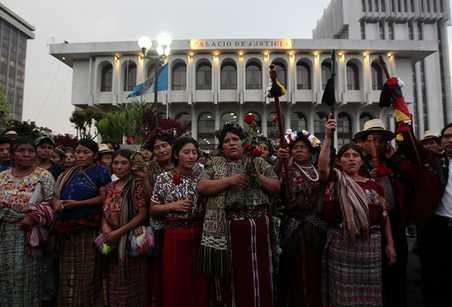Ríos Montt Convicted of Genocide and Crimes Against Humanity: A Victory for Accountability and Justice in Guatemala

Retired General José Efraín Ríos Montt, the U.S. backed dictator who governed Guatemala from March 1982 to August 1983, was sentenced by Judge Yasmín Barrios to 80 years in prison yesterday, 50 years for genocide, and 30 years for crimes against humanity. The focus of the trial was on the murder of 1,771 Ixil Mayas. Rodriguez Sánchez, a former intelligence director, was acquitted of all charges.
During the civil war in Guatemala (1960 – 1996), more than 200,000 Guatemalans were massacred, in the large majority of cases by the Guatemalan army, civil patrols, and other state agents. Most of these atrocities were committed between 1978 and 1984. For most of this period Guatemala was among the worst human rights offenders in the hemisphere.
This trial marks the first time someone with command authority over the perpetrators of forced disappearances, torture, rape, and the mass murder of Guatemalan citizens has been tried and convicted for genocide and crimes against humanity in Guatemala.
This conviction raises important questions about the accountability of those involved in supporting the Guatemalan security forces directly involved in these crimes. Grahame Russell of Rights Action (rightsaction.org), who has reported extensively on the genocide trial in Guatemala, said: “The trial and guilty verdict are an extraordinary achievement in light of the continuing repression and injustice in Guatemala today. It is also a sad moment if one considers that it took 31 years to bring Ríos Montt to justice, and he is only one of the intellectual authors of the genocide. President Otto Pérez Molina himself was a high-ranking officer at the time Ríos Montt held office. Also, while we are praising the courage of the witnesses and all of those who took on this case, perhaps we can also muster the fortitude to hold those U.S. officials who are co-responsible for the genocide accountable.”
International human rights organizations played an important role in supporting and disseminating information about the trial. It is impossible to exaggerate the courage of the non-governmental human rights organizations in Guatemala, the witnesses who testified at the trial, and the actors in the criminal justice system of Guatemala who have risked their lives in seeing this prosecution through to the end. Today humanists throughout the world join the Ixil people and other survivors of the genocide in celebration and anticipate that this conviction will accelerate the trend towards justice and accountability throughout the hemisphere.
Frederick B. Mills is a Senior Research Fellow at the Council on Hemispheric Affairs.
For information on this topic, please contact the Council on Hemispheric Affairs at:
202-223-4975 – COHA Office
202-215-3473 – Larry Birns, COHA Director
202-333-1959 – Larry Birns, home phone
Please accept this article as a free contribution from COHA, but if re-posting, please afford authorial and institutional attribution. Exclusive rights can be negotiated.
For additional news or analysis on Latin America, please go to: Latin News

